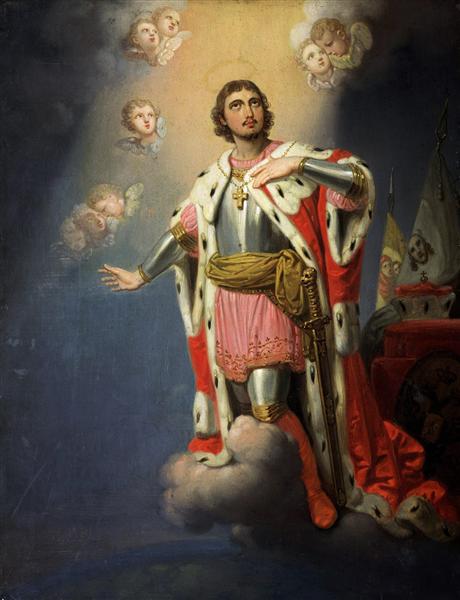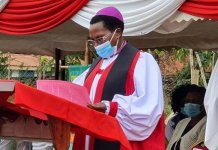The Synod of the Ukrainian autocephalous Orthodox Church Pzu (Pravoslavnaja Zerkov Ukrainy) has decided to exclude from the liturgical calendar the memory of the holy Russian prince Aleksandr Nevsky, victor in the battles against the Westerners and advocate of compromise with the Tatar Horde in the 13th century.
This is not a de-canonisation or an “anathema against a saint”, as it is described in the Russian press, which denounces yet another move of the “Ukrainian schism”, since each local Orthodox Church (there are 15, including the Ukrainian one not recognised by the Russians) arranges the celebrations of saints according to its own criteria, but in the light of the conflict between Russia and Ukraine, the decision appears to be a sort of “spiritual nuclear missile” launched by Kiev against Moscow, as Aleksandr Soldatov notes in Novaja Gazeta.
The exaltation of the figure of Alexander Nevsky has been the rhetorical premise of the religious justification of Russia’s conflict against the hostile West, starting with the celebrations for the 800th anniversary of his birth in 2020.
The young provincial leader was Prince of Novgorod, then Grand Duke of Kiev and Vladimir at a crucial moment in Russian history, that of the Tatar invasion in 1240. His hometown was outside the Mongol Khan assault routes, and he achieved historic victories, later clothed with apocalyptic-historical significance, in 1239 (at only 19 years of age) against the Swedes on the Neva River – hence the title Nevsky – and in 1242 on the ice of Lake Peipus against the Teutonic Knights, heirs of the Templars sent to the shores of the Baltic to conquer the northern lands to Catholicism, and sunk in what was then epically remembered as the ‘battle of the ice’.
After the death of his father, he remained the only free prince of ancient Rus’, and from 1247 began a series of negotiations with the Tatars by travelling as far as the seat of the Great Khan at Karakorum in Mongolia, in a delegation that was also joined by a representative of the Roman papacy, the Franciscan Giovanni del Piano Carpine, who later passed on in his memoirs the account of the destruction of the city of Kiev, and the description of the Asian empire in the great Historia Mangolorum.
Although he was not forced to do so, Aleksandr agreed to obtain from the Tatars the confirmation of the princely title, the famous yarlik that constituted the system of government of the Russian principalities for over two centuries, against payment of the dan, the subjugation tax to be paid with dengi, the Mongolian money, all terms that remained in the Russian language as the only legacy of the ‘Tatar yoke’, that of the centralised administration of the Eurasian Horde, very similar to the Putinian “vertical of power”.
The prince’s exploits attracted the interest of Pope Innocent IV, who sent a couple of cardinals to Vladimir – the new capital, which had replaced Kiev razed to the ground – to convince Aleksandr to reunite with Rome, also to escape Asian domination, but he replied that “we have everything we need in the tradition of the faith”, becoming the forerunner of Holy Russia rejecting any union with the Latins.
The popes had managed to pull Prince Daniil of Galicia, a western region of Rus’ (now between Poland and Ukraine), to their side a few years earlier, creating even then a situation similar to the ecclesiastical-political schism of today. With his settlement in Vladimir, moreover, Aleksandr laid the foundations for the translatio of the mother city from Kiev to Moscow, then still a simple post station, founded by the princes of Vladimir.
Nevsky died in 1263 while on his way to visit the Khan of the Golden Horde in Saraj in the Caucasus, on the shores of the Caspian Sea, accompanied by Metropolitan Kirill of Kiev, who had followed the prince by opening the seat of Suzdal, 20 kilometres from Vladimir, in what would later be called the ‘Golden Ring’ of ancient Russian cities.
He was canonised by the Council of Moscow in 1547, known as the ‘Hundred Chapters’, which was held at the same time as the Council of Trent and had a similar significance for Russia to the Catholic Counter-Reformation, defining the ideology of the Church as the ‘institutor of the State’ that is now being relaunched by Patriarch Kirill in support of the new version of the ‘Russian world’.
The figure of Aleksandr at that time was further exalted by the first Tsar Ivan the Terrible, who intended to impersonate the superiority of ‘Moscow – Third Rome’ over the entire Christian world.
Peter the Great also had recourse to the epic of the holy prince, transferring his relics from Vladimir to St. Petersburg, the new capital he founded at the mouth of the Neva, naming the victories of the new Russian army and navy, created precisely to defeat the Swedes once and for all, after him.
A few weeks ago, Aleksandr’s relics and sarcophagus were brought back by the patriarch’s will to the Lavra named after him, with symbolic intentions similar to the transport of Rublev’s icon of the Trinity, at the end of the grandiose Nevsky Prospect around which the streets and canals of the scenic capital of the North, the ‘City of St. Peter’ of a new imperial vision of a Western type, wind.
Hundreds of churches in Aleksandr’s honour were built at the time of Alexander II in the second half of the 19th century, and the very name of the Tsar (like his uncle Alexander I) was still decided upon by Catherine II to honour the holy prince, evoking at the same time the exploits of Alexander the Great.
Even in Soviet times, an ‘atheist’ cult of Aleksandr Nevsky developed on the initiative of Stalin, as an inspiration for resistance to the Nazi invasion during the Great Patriotic War.
The first to lash out against the sacrilegious Ukrainians was the “retired” Metropolitan Leonid (Gorbačev), former Russian ex-arch for Africa and “spiritual father” of the late Evgenij Prigožin, who was also rejoicing at having succeeded in rejecting the session of the ecclesiastical tribunal by which Patriarch Kirill intended to oust him definitively, now postponed to a date to be determined thanks to mysterious interventions “from above”.
The metropolitan, a former soldier and chaplain to all kinds of fighters, called the Pzu hierarchs “thugs in disguise”, while the saintly Aleksandr remains “a challenge and a mental threat” to Ukraine and the entire West, protecting Russia from any attempt to defeat it and erase it from history.
Patriarch Kirill himself recalled that the fate of Aleksandr Nevsky represents “the entire historical perspective of Russia”, which would therefore be the vocation to fight eternally against the West and to submit to the East, then to the Mongols and now to the Chinese, who after all are the main heirs of Genghis Khan.
Indeed, it is not surprising that the Ukrainians wanted to get rid of this symbol of neo-imperial ideology, in the process of de-colonisation from Russian oppression, and other ‘protector of Russia’ saints such as Sergius of Radonež, who blessed the troops of Moscow prince Dmitry Donskoj, or his disciple Andrei Rublev, whose icons are used by the patriarch as flags of the ‘Russian trinity’ of the reunion of the original countries, perhaps even as far as Seraphim of Sarov, the starets canonised by Tsar Nicholas II, himself declared a saint in 2000, as the inspirer of the Putin era.
Moreover, it was Kirill himself who, as metropolitan in 2001, proposed the canonisation of Admiral Fyodor Ušakov, the commander of the Russian Black Sea fleet at the end of the 18th century, famous throughout the East as “the invincible Ušak-Pasha”, whom no one thought could even end up in the choir of saints.
Today, the Patriarch is also pushing to elevate to the honour of the altars the generalissimus Aleksandr Suvorov, who has already been awarded all kinds of noble titles, including that of Prince of Italy, for his countless victories without ever being defeated, and at this rate it is likely to go as far as Soviet heroes such as Marshal Georgij Žukov, liberator from the Nazis and repeatedly compared by Kirill to St George the Victorious, or the astronaut Jurij Gagarin, who launched himself into space before the Americans almost self-canonised, even though on his return he claimed that he ‘had not seen God’.










